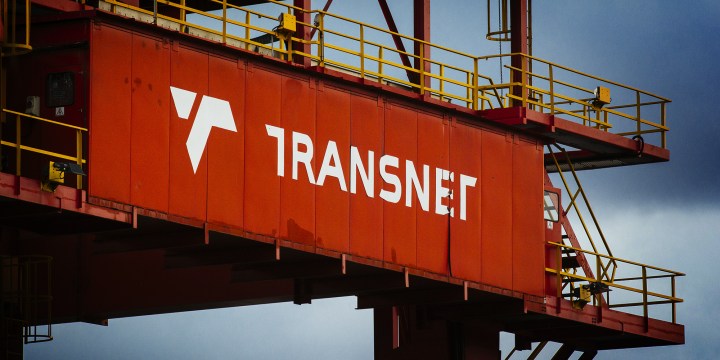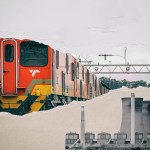BUSINESS MAVERICK
Transnet financials on the wrong side of the tracks, but there’s no need for a begging bowl

Transnet released its results late last week and, to the relief of the government and taxpayers alike, this is one state-owned entity that will not need to go cap in hand for a bailout. However, the company is no longer the cash cow it used to be, and the group’s performance and financial metrics are looking a tad shaky.
Transnet CEO Portia Derby has been at the helm of the organisation for a little over nine months – long enough to get to grips with the operational and financial challenges facing the giant logistics operator.
Of the six major risks identified as being a threat to future prosperity, two have the real potential to derail Derby and her team’s turnaround efforts. These are Transnet’s financial sustainability and its market growth risk – in other words, its poor service and poor infrastructure, which are causing customers to seek alternatives.
The latest set of financial results – while superficially solid – reflect cause for concern.
Despite economic growth of just 0.2% in 2019, and many operational challenges, Transnet realised a 1.3% increase in revenue to R75.1-billion, largely thanks to an average tariff increase of 2.9%.
But volumes in the group’s largest business units – rail and ports – have fallen, as have fuel volumes transported for the year.
These declines offset the gains made from the tariff increase.
Arresting further volume declines, while simultaneously investing in current and new assets, is management’s biggest challenge.
“The downturn has sharply affected our business,” says Derby. “Transnet is a high fixed-cost business with heavy reliance on a long-term invested asset base, and it has been difficult to rapidly realign our cost base to the declines in customer demand.”
Cost containment efforts resulted in a slight increase in Ebitda (earnings before accounting treatments) to R34-billion, but margins are being squeezed.
“The more recent focus on improving operating efficiencies across Transnet has exposed just the extent of our maintenance backlog in some parts of our business, and the weaknesses that have been encountered in operational effectiveness,” notes Derby in the AFS.
The group generated net profit of R3.9-billion for the year – a 35% decrease on the previous year. This was primarily due to the previous year’s fair value adjustments being R2.5-billion higher than the current year, note group CFO Nonkululeko Dlamini and group treasurer Mark Gregg-Macdonald in their report.
What will give bondholders some comfort is that cash generated from operations increased by 2.1% to R35.9-billion and that, at 47.6%, Transnet’s debt to equity ratio remains within the 50% limit agreed to with its shareholder.
“While working capital remains constrained, we are satisfied that we can meet our short-term debt redemption obligations,” says Dlamini.
Unfortunately, or maybe fortunately, we now have a balance sheet that requires us to prioritise investments that have a direct link to revenue generation, through either sustaining or enhancing more efficient business operations or carefully expanding our business to meet customer demand and generate additional revenue.
Finance costs remain high, and efforts were made to source more cost-effective funding and to optimise capital expenditure, with the result that net finance costs decreased marginally by 0.4% to R11.17-billion.
What is alarming, however, is Transnet’s statement of comprehensive income, which records a comprehensive loss of R18-billion for the year, up from R11-billion last year.
This has to do, largely, with Transnet’s revaluation of assets. It wrote the value of its ports infrastructure down by R16-billion and the rail infrastructure down by R15-billion, which comes on top of a R23-billion write-down in 2019.
In other words, Transnet’s infrastructure is crumbling; it’s not being maintained or replaced fast enough and this is eroding the value of the company – not to mention its ability to perform optimally.
The new management team is now focused on making better capital allocation decisions.
In the past, high levels of capital investment were poorly coordinated and unbalanced. For instance, the high level of investment in locomotives and wagons was not matched by the necessary investment in the rail network and terminals, and in maintenance in general.
“Unfortunately, or maybe fortunately, we now have a balance sheet that requires us to prioritise investments that have a direct link to revenue generation, through either sustaining or enhancing more efficient business operations or carefully expanding our business to meet customer demand and generate additional revenue,” says Derby.
Derby acknowledges that various capital projects are running over time and budget, affecting operations.
Another challenge is the sabotage of key infrastructure assets as well as theft. Transnet reports that spillages from its multi-fuel pipeline have increased by 58% in the year – a direct result of highly coordinated fuel theft from the pipeline, which is growing exponentially.
Transnet’s 2020 results have a qualified audit opinion on them.
“Some basic housekeeping involves the strengthening of controls to address the irregular expenditure that continues to plague us. Among our most urgent tasks is the overhaul of the procurement and finance functions across the organisation. It is clear from the auditors’ report that these have been the weakest link for Transnet,” Derby says.
She and her team are well aware of the crucial role Transnet plays in driving economic growth in South Africa, and potentially the region.
Much work has been done, but what is clear from these results is that turning this ship around will take time. DM/BM


















 Become an Insider
Become an Insider
Dare we hope that we have a CEO at this important SOE who has a braincell and the cahones to implement much needed change and who seems to be focused on the business needs rather than what she can plunder from the business?
Let’s hope!!